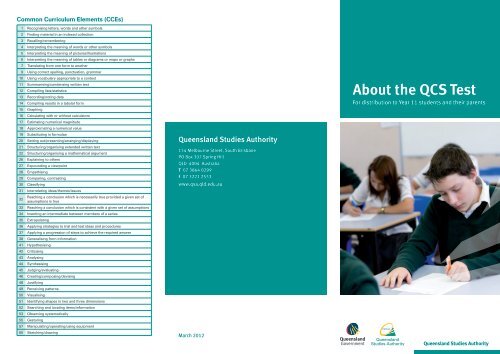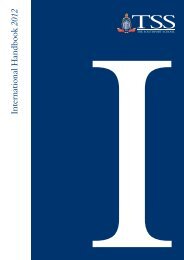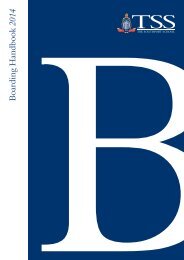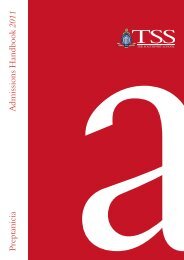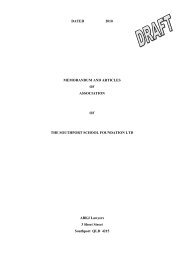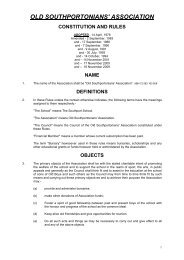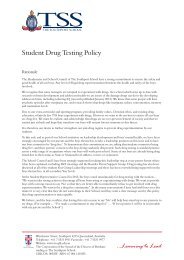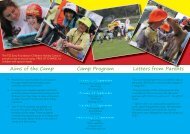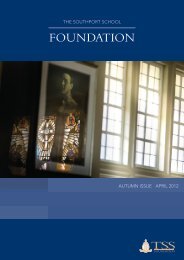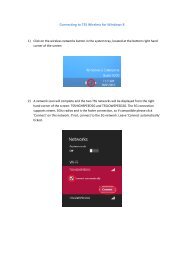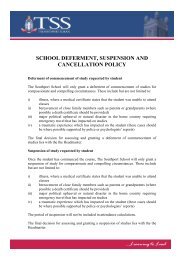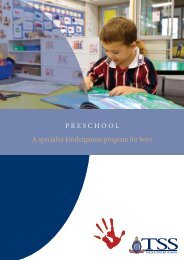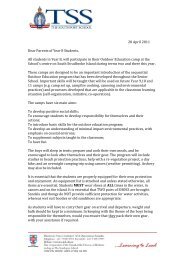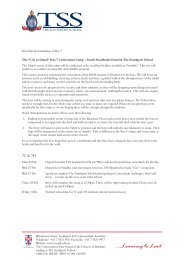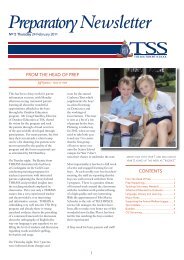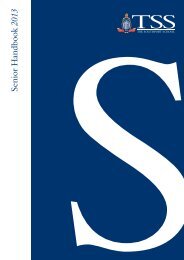About the QCS Test brochure
About the QCS Test brochure
About the QCS Test brochure
You also want an ePaper? Increase the reach of your titles
YUMPU automatically turns print PDFs into web optimized ePapers that Google loves.
Common Curriculum Elements (CCEs)<br />
1 Recognising letters, words and o<strong>the</strong>r symbols<br />
2 Finding material in an indexed collection<br />
3 Recalling/remembering<br />
4 Interpreting <strong>the</strong> meaning of words or o<strong>the</strong>r symbols<br />
5 Interpreting <strong>the</strong> meaning of pictures/illustrations<br />
6 Interpreting <strong>the</strong> meaning of tables or diagrams or maps or graphs<br />
7 Translating from one form to ano<strong>the</strong>r<br />
9 Using correct spelling, punctuation, grammar<br />
10 Using vocabulary appropriate to a context<br />
11 Summarising/condensing written text<br />
12 Compiling lists/statistics<br />
13 Recording/noting data<br />
14 Compiling results in a tabular form<br />
15 Graphing<br />
16 Calculating with or without calculators<br />
17 Estimating numerical magnitude<br />
18 Approximating a numerical value<br />
19 Substituting in formulae<br />
20 Setting out/presenting/arranging/displaying<br />
21 Structuring/organising extended written text<br />
22 Structuring/organising a ma<strong>the</strong>matical argument<br />
26 Explaining to o<strong>the</strong>rs<br />
27 Expounding a viewpoint<br />
28 Empathising<br />
29 Comparing, contrasting<br />
30 Classifying<br />
31 Interrelating ideas/<strong>the</strong>mes/issues<br />
32<br />
Reaching a conclusion which is necessarily true provided a given set of<br />
assumptions is true<br />
33 Reaching a conclusion which is consistent with a given set of assumptions<br />
34 Inserting an intermediate between members of a series<br />
35 Extrapolating<br />
36 Applying strategies to trial and test ideas and procedures<br />
37 Applying a progression of steps to achieve <strong>the</strong> required answer<br />
38 Generalising from information<br />
41 Hypo<strong>the</strong>sising<br />
42 Criticising<br />
43 Analysing<br />
44 Syn<strong>the</strong>sising<br />
45 Judging/evaluating<br />
46 Creating/composing/devising<br />
48 Justifying<br />
49 Perceiving patterns<br />
50 Visualising<br />
51 Identifying shapes in two and three dimensions<br />
52 Searching and locating items/information<br />
53 Observing systematically<br />
55 Gesturing<br />
57 Manipulating/operating/using equipment<br />
60 Sketching/drawing<br />
Queensland Studies Authority<br />
154 Melbourne Street, South Brisbane<br />
PO Box 307 Spring Hill<br />
QLD 4004 Australia<br />
T 07 3864 0299<br />
F 07 3221 2553<br />
www.qsa.qld.edu.au<br />
March 2012<br />
<strong>About</strong> <strong>the</strong> <strong>QCS</strong> <strong>Test</strong><br />
For distribution to Year 11 students and <strong>the</strong>ir parents<br />
Queensland<br />
Studies Authority<br />
Queensland Studies Authority
The Queensland Core Skills (<strong>QCS</strong>) <strong>Test</strong> is:<br />
• a common statewide test for Queensland Year 12 students<br />
• an achievement test — not an intelligence test nor an aptitude<br />
test<br />
• grounded in <strong>the</strong> Queensland senior curriculum<br />
• accessible to all Year 12 students, regardless of <strong>the</strong>ir subject<br />
selections.<br />
What does it test?<br />
It tests 49 Common Curriculum Elements (CCEs) of <strong>the</strong><br />
Queensland senior curriculum.<br />
These 49 elements are listed on <strong>the</strong> back of this <strong>brochure</strong>.<br />
The level of sophistication demanded by <strong>the</strong> test is appropriate<br />
to Year 12 students. Particular knowledge of specific senior<br />
subjects is not tested. However, <strong>the</strong> test assumes an elementary<br />
level of general knowledge and a knowledge of vocabulary and<br />
ma<strong>the</strong>matical operations that could reasonably be expected of<br />
a student with a sound general Year 10 education.<br />
What is <strong>the</strong> purpose of <strong>the</strong> test?<br />
The QSA uses <strong>QCS</strong> <strong>Test</strong> data to provide:<br />
• group results which are used for comparing student<br />
achievement across different subjects and different schools<br />
as part of <strong>the</strong> OP and FP calculation processes<br />
• individual results which are used to give a grade on an<br />
A to E scale for each student.<br />
What is in <strong>the</strong> test?<br />
The <strong>QCS</strong> <strong>Test</strong> consists of four testpapers:<br />
• one Writing Task (WT)<br />
• one Short Response (SR)<br />
• two Multiple Choice (MC).<br />
When is it held?<br />
The <strong>QCS</strong> <strong>Test</strong> takes place over two consecutive days late in Term 3.<br />
For next year’s dates, check with your school or <strong>the</strong> Queensland<br />
Studies Authority (QSA) website: .<br />
morning<br />
afternoon<br />
TUESDAY<br />
paper 1<br />
Writing Task<br />
2 hours<br />
paper 2<br />
Multiple Choice I<br />
1 hour 30 minutes<br />
WednESDAY<br />
paper 3<br />
Short Response<br />
2 hours<br />
paper 4<br />
Multiple Choice II<br />
1 hour 30 minutes<br />
In <strong>the</strong> test, you will be expected to respond to various stimulus<br />
material such as prose passages, poetry, graphs, tables, maps,<br />
ma<strong>the</strong>matical and scientific data, cartoons and reproductions<br />
of works of art.<br />
The WT testpaper will ask you to compose an extended piece<br />
(about 600 words) of continuous prose in response to <strong>the</strong><br />
stimulus material provided.<br />
Items on <strong>the</strong> SR testpaper will ask you to respond in various<br />
ways, such as writing a sentence or paragraph, drawing a<br />
diagram, performing a calculation or sketching.<br />
For each item on <strong>the</strong> MC testpapers, four possible responses<br />
are presented as options. You will be asked to select <strong>the</strong> best<br />
option.<br />
What preparation is useful?<br />
The CCEs are generic skills that you work with across your<br />
subjects, <strong>the</strong>refore your preparation for <strong>the</strong> test goes on all<br />
<strong>the</strong> time and in every subject. However, you can also prepare<br />
more directly for <strong>the</strong> test by becoming familiar with <strong>the</strong> CCEs<br />
and how <strong>the</strong>y might be assessed in <strong>the</strong> test. You could devise<br />
strategies that will help you to work with <strong>the</strong> CCEs.<br />
Practise writing 600-word responses to past WT testpapers.<br />
Become aware of how much space 600 words of your writing<br />
takes up. Experiment with various forms and styles of writing<br />
to see which are your strongest.<br />
Read widely. Develop skills to help you write clearly, simply<br />
and economically, whatever your purpose.<br />
Refresh your knowledge of CCEs that are ma<strong>the</strong>matical in<br />
nature by reviewing concepts such as percentage, ratio, angle,<br />
power of ten notation, and elementary algebraic procedures.<br />
Find out <strong>the</strong> meanings of <strong>the</strong> key terms used in <strong>the</strong> SR<br />
testpaper. They will help you understand what type of response<br />
to provide. The key terms are listed in <strong>the</strong> Student Information<br />
Bulletin (SIB) which is provided to all Year 12 students and is<br />
available on our website: .<br />
What if you need special provision?<br />
If you have a recognised impairment that could make it<br />
difficult for you to sit <strong>the</strong> test, we may be able to assist. Talk<br />
to your teachers or <strong>the</strong> school guidance officer now if you<br />
think you will need some variation in <strong>the</strong> arrangements. If you<br />
would like more information about special provision, visit our<br />
website.<br />
What equipment is necessary?<br />
You will need your normal writing equipment (pens, pencils,<br />
ruler, eraser). Use a pen, except for recording your responses<br />
to <strong>the</strong> MC testpapers, where a 2B pencil must be used, or<br />
when you are told to do o<strong>the</strong>rwise for particular SR items.<br />
The SIB and front covers of past testpapers will tell you <strong>the</strong><br />
essential and optional equipment for each testpaper.<br />
You may use an approved hand-held, solar or batteryoperated,<br />
noiseless calculator. An approved calculator is one<br />
that does not have a spell checker, dictionary, <strong>the</strong>saurus,<br />
translator or CAS facility.<br />
You must not take into <strong>the</strong> test room any unauthorised<br />
equipment, including a mobile phone or any o<strong>the</strong>r<br />
communication device. A supervisor may inspect your<br />
equipment at any time during <strong>the</strong> test.<br />
How are responses to <strong>the</strong> test marked?<br />
WT and SR responses are marked by trained markers.<br />
WT markers mark according to predetermined standards<br />
developed for a set of criteria. SR markers are given detailed<br />
instructions and a specific marking scheme for each item.<br />
Each WT response is marked by at least three different<br />
markers and each SR response by at least two different<br />
markers. Markers work independently. Referee marking<br />
occurs if markers disagree. There is a process for monitoring<br />
marker consistency.<br />
The responses for <strong>the</strong> two MC testpapers are marked<br />
electronically. Each correct response scores one mark, and<br />
each incorrect response and each unattempted question<br />
scores zero.<br />
More information<br />
O<strong>the</strong>r publications on <strong>the</strong> <strong>QCS</strong> <strong>Test</strong> are available from your<br />
school and from <strong>the</strong> QSA. Past testpapers are also available.<br />
For information about prices and availability of publications<br />
or for fur<strong>the</strong>r information about <strong>the</strong> <strong>QCS</strong> <strong>Test</strong>, OPs and FPs,<br />
visit <strong>the</strong> QSA website or<br />
email: office@qsa.qld.edu.au or phone (07) 3864 0299.


